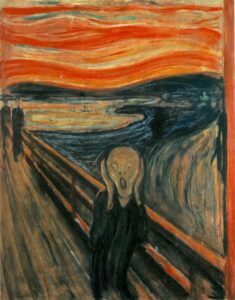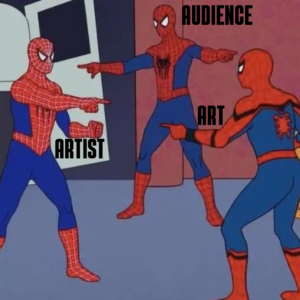By Devatrai Jha and Shrey Paul, Batch of 2026
 (The Scream, by Van Gogh)
(The Scream, by Van Gogh)
“Paintings have a life of their own that derives from the painter’s soul.”- Vincent Van Gogh
From Kanye West’s inflammatory statements targeting Jewish people and praising Hitler to HP Lovecraft’s extreme vitriol toward any human being he deemed not white enough, the role of an artist in the interpretation of their work has always been a raging debate.
Hajime Isayama’s manga Attack on Titan has been an unparalleled success, but it has also generated an equal amount of conspiracy. The series’s conflicting use of fascist and anti-semitic tropes and themes has left many wondering whether the story ultimately means to condemn or condone such elements. With the use of these themes often being inconsistent and contradictory, many have turned to the author to decipher the true intent of the story.
Information from Isayama’s past tends to get dredged up during arguments when people try to support their personal interpretation of the message of the story. His use of World War II general Akiyama Yoshifuru- largely considered a war criminal in China and Korea as inspiration for the character of Dot Pixis has generated much controversy and debate. Lines have been drawn rigidly on this discussion, with some either believing that the controversy has no weight, while some deeming it worthy of the harshest condemnation for its use of such themes. Hajime Isayama himself has declined to weigh in on the discussion, stating that “Being a writer, I believe it is impolite to instruct your readers how to read your story.”
Meraki. An exquisite Greek word that encapsulates the heart, soul, and part of ourselves that we pour into our work. It’s everything from the stirring strokes a painter washes their canvas with to the fascinating anecdotes an author’s quill could have masqueraded as fiction. If our souls truly inhabit our works, our identity imprinted on what we create, how much can we separate our work from who we are? Does a song then not embody its creator and their morals, ethics, and ideas? Is it not valid to judge an artist’s works through the lens of their words?
One is left to wonder if one can simply walk away from what they have created. If a bird leaves its nest, does it mean it has flown away, or will it be forever tied to where it came from?
When a work of art is put out to the world it no longer belongs to the artist- it is now in the possession of the public. When one consumes art, they breathe into it new life, for meaning and interpretation are not as static or pure as one would love to believe. A lifetime of experience and biases, examined and unexamined, shape and transform what we consume. An artistic experience is not rigid, but amorphous and will constantly be moulded by the person relishing the artwork. To state that a piece of artwork is examined solely by the eyes and the mind would be proven false at the slightest probing, for it is the heart that beats the loudest and most harmonious when one experiences the ecstasy that is art.
So where is the place of the artist in this equation? Have they been abandoned, relegated to the shadows, as the consumer of their creation blends their heart and mind in the wake of pure experience?
It would be foolish to assume so, for it is undeniable that the history of the creator and their stated intent have the power to distort the vision of a carefree flick of the brush into one filled with rage or sorrow. Though not impossible to separate, once the intent of the brush is made known, it may not be possible to see the strokes in the same light anymore.
Parallelly, should we not respect an artist’s entitlement to their own personal opinions on issues and to express them? Should they always utter the filtered phrases permeable by standards that the public defines, or which the public wants to see and hear?
We’re not exactly electing leaders to run a country. How, then, should the creators’ ideas and thoughts and agendas not concerning their work bother the common man?
Should we think any less of ‘The Old Guitarist’ because Picasso was a vile misogynist, or deny how central artists like John Lennon have been in revolutionising the art form that is music because he was an abusive father and husband?
Has history not cheered on geniuses whose moral canvas was tainted by similar corruptions? Misogyny, racism, colonial mentality, homophobia and other deficiencies have all plagued the minds of great scientists and inventors throughout history, as they have in the artistic world. Why should ethics be a metric quantifier to gauge a piece of artistic creation? Is the true value of art not artistic appeal and expression or its ability to pull at the audience’s heartstrings, to tether them to its world? Why should art in all its forms be tried in court when other domains like science have relished in the unquestioned separation of work from personal life?
Humans are complex beings, and artists even more so. When we enjoy someone’s work, there is a desire to project our own feelings onto it– and by extension on the artist– so it is not surprising then that people would almost expect their favourite artist to hold the same values as them. A sense of betrayal and shock is not uncommon when this illusion of common beliefs is almost inevitably shattered.
Is it not, after all, justified for a fan of her works to be disturbed and angered by J.K. Rowling’s transition from a beloved author to a fascist promoting figurehead of a transphobic anti-feminist cult? Is it not right to choose not to stay silent, when a person with both artistic and social influence on the masses harms people with their ignorance or worse, malicious intent?
Cultural references and fan following make it evident that artists hold a strong influence. If one buys tickets to an artist’s concert, listens to their music and buys their albums, they are- directly or indirectly- monetarily supporting them, and therefore funding their artistic endeavours. They are sending a message- “Yes, I appreciate your work and I want you to keep doing it.” That message in turn enables them to further strengthen their presence on the global stage.
Of course, every individual, whether in the spotlight or in the lamplight of an ordinary life, is entitled to having their own opinions. However, the audience gives artists a licence to evolve from yet another common man to a celebrity, who people around the world will listen to. Does the power to bestow such influence on artists not also give us the duty to take this influence back when they are using it in ways that cause harm?
Art is a drug more potent than any other, one that truly draws us all in, and tethers us to this world as well as the many worlds that only exist as figments of human creation. It’s the language of the soul, one whose cadence every beating heart can dance to, one that links men- dead and alive, and one that stirs the soul. It is something that truly connects us all, transcends all barriers and draws us all in.
Art is one of the greatest creations of humanity, but perhaps it’s not art that is the creation of humanity, but humanity that is the creation of art. It is the everlasting symbol of man- from crudely painted figures on walls forty thousand years ago to Romeo and Juliet, art is inseparable from the history of our species.
Given the almost limitless persuasive power art holds, we should then, by all means, be afraid of it. The human mind responds more to narrative than to fact, it is known. A good propaganda piece can persuade one to take any radical position, it can turn one to hate, it can influence global policy and shift public perception entirely.
We should be afraid of it. Yet, we aren’t. Yet, throughout history, censoring art has never been seen as anything more than the pastime of tyrants and fascists. It is a good and beautiful thing, that the burning of books brings to one’s mind only the behaviour of scared, hateful Nazis.
Art is powerful because it is so exquisite, because it is so evocative, and because it has the capacity to move us so fervently to such a great extent. This is why, at the end of the day, the beauty of art will always trump the role that the artist plays in its creation. At the end of the day, the experience of the people who revel in the art is something that the artists’ worst crimes cannot truly take away from them.
AUTHORS’ NOTE: We almost named this article “We just killed a bunch of artists in cold blood and made 1000 people analyse their work!! (Gone wrong??)”.

